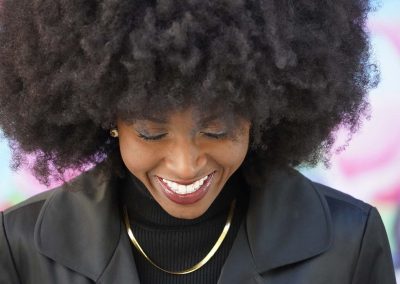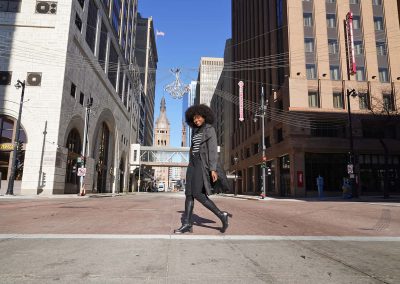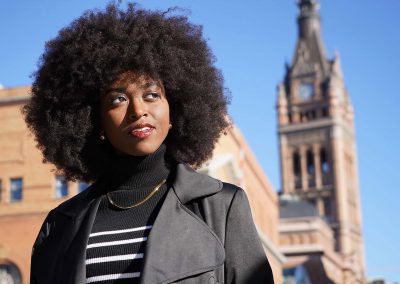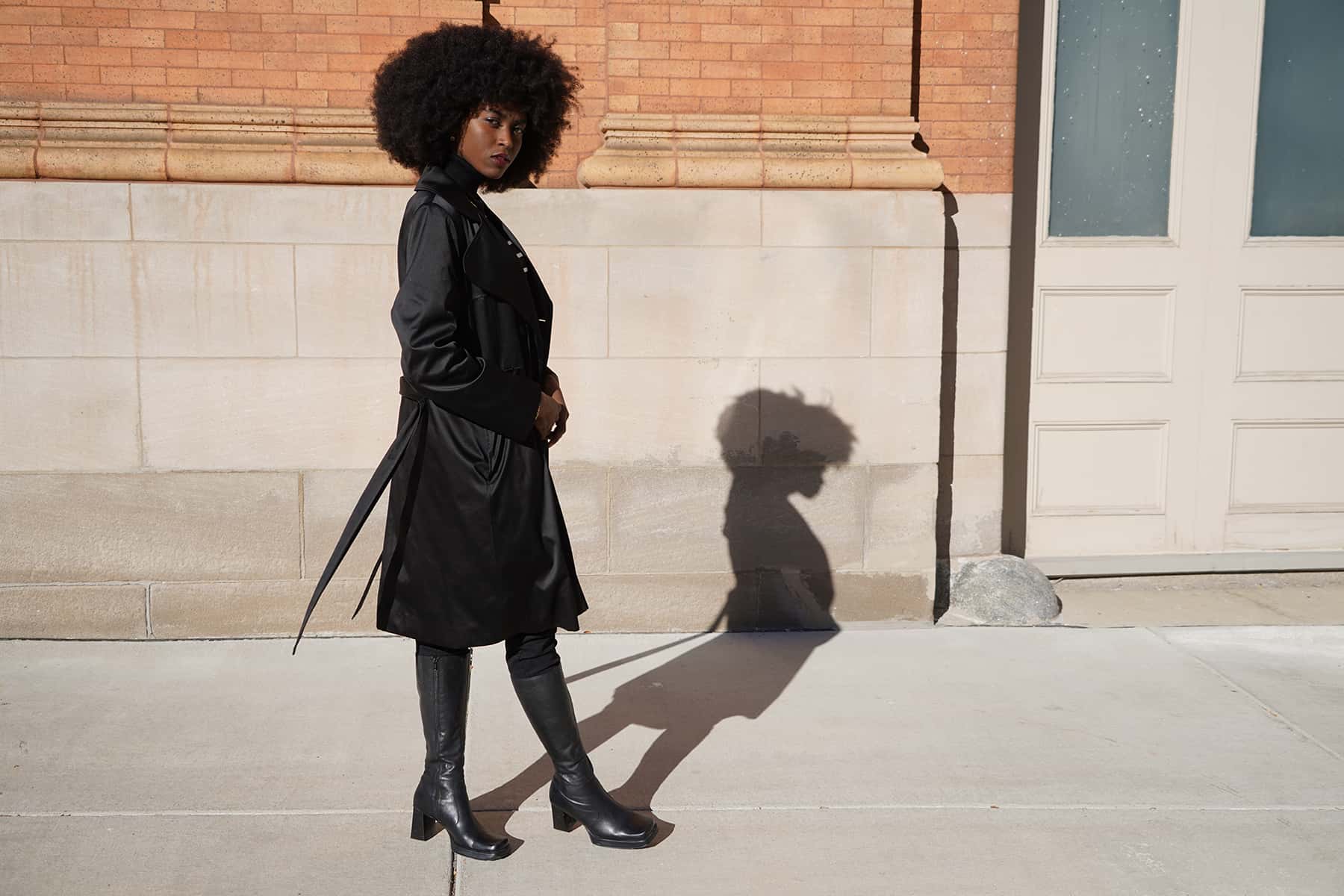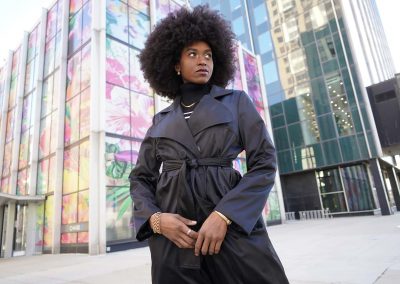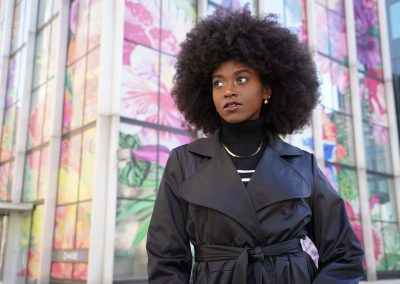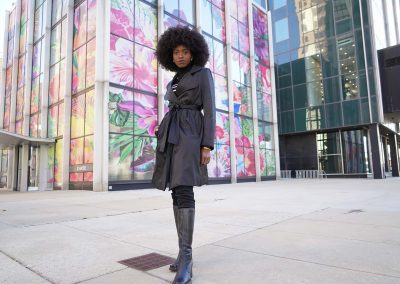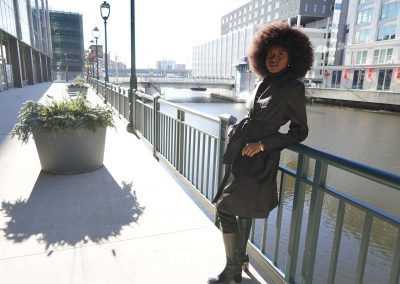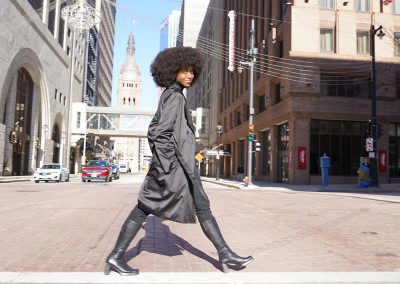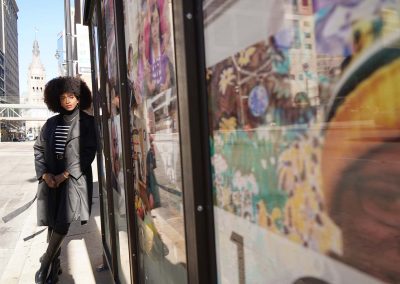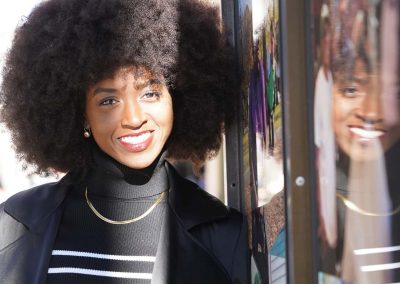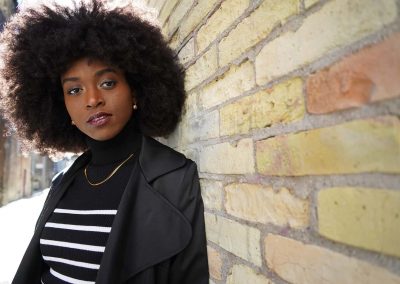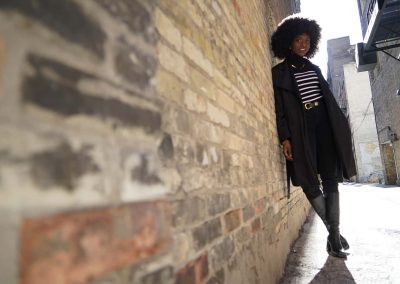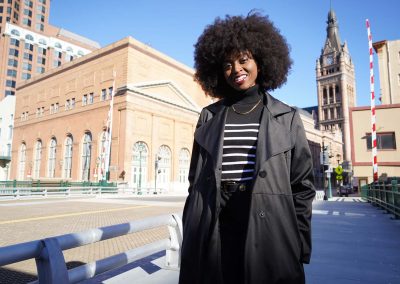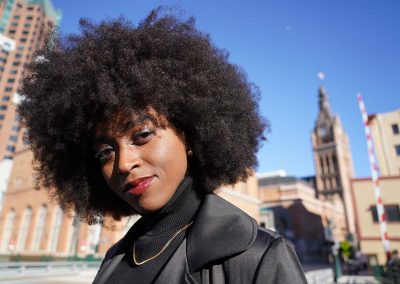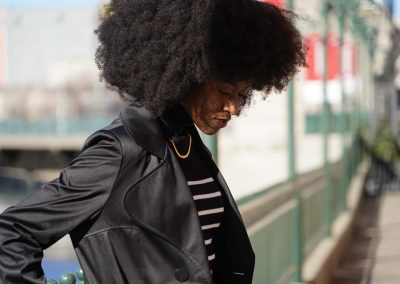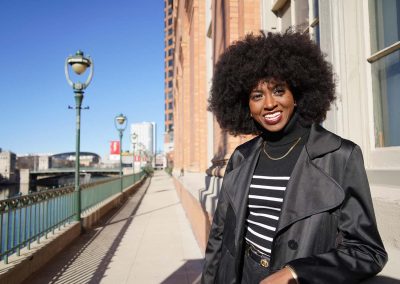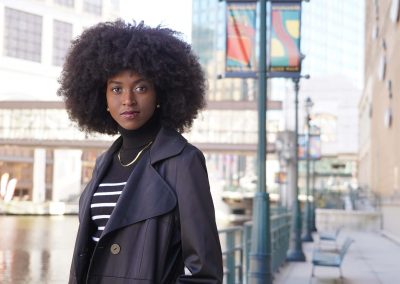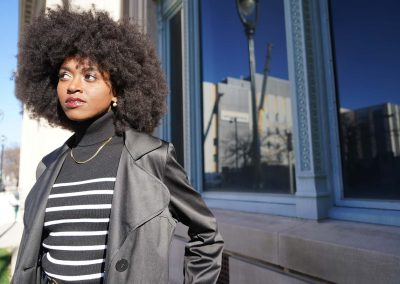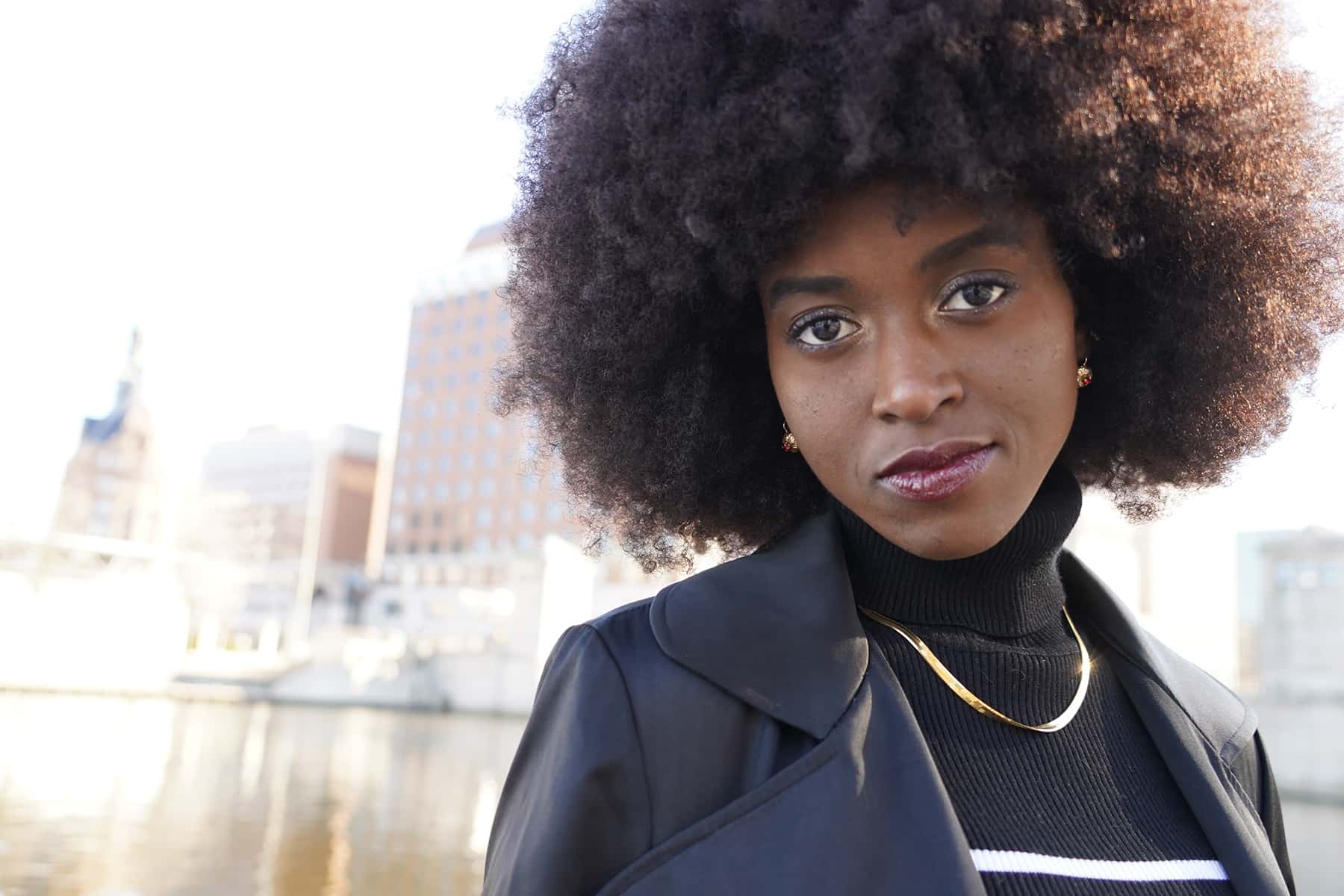
As a recent University graduate, Julia Papillon draws from her family’s history of sacrifice and hard work as an inspiration to find her purpose in the world and help empower other Milwaukee women of color.
Once an individual reaches a level of success or recognition in their life, they have the perspective to reflect on their path as a roadmap for others to follow. But at times, someone at the start of their career journey already has an amazing story and insight. These rare individuals are worth following, to watch in realtime as they grow exponentially. Julia Papillon is one such person who Milwaukee should keep an eye on over the next decade, as she brings her talents to the local community by helping to redefine expectations of young Black women and their future possibilities.
Q&A with Julia Papillon
Milwaukee Independent: What is your fondest memory of growing up in Illinois, and who was the most influential person during your youth?
Julia Papillon: My fondest memory of growing up in Illinois would have to be the fact that I grew up in an extremely diverse area. I’m from Gurnee, Illinois. Until moving to Milwaukee, I had lived in the same house for all of my life. While the area is predominantly white, the town I grew up in is host to a wide range of ethnicities, religious denominations, and income brackets. Being there, I didn’t even realize the diversity I was surrounded with. My friend group reflected every color of the rainbow. Looking back, I see I really took that for granted. I was really in quite the bubble of a town. The most influential people in my youth would have to be my parents David and Pamela Papillon. Surprise surprise right? They created a little ball of energy that wanted to do EVERYTHING. Whether it be dance, art, soccer, choir, tennis, band, modeling — my parents were right there clearing the path for me to do it all. My parents are both immigrants from simple beginnings in the West Caribbean islands. They both have amazing coming to America stories. One day, when I was probably being an ungrateful little brat (sorry mom) my father was really the one to point this out to me. My mother was never going to have a child of hers not doing something they wanted to do. Not exploring an avenue they wanted to take. This is an opportunity they both didn’t have as children, so they’ve made it their personal plight to do so for their children. This really put my life into perspective, it sounds so simple. Parents are there to provide. But when you really think about all that goes into growing a human, the sacrifice, the selflessness, the love, I just can’t thank my parents enough for the position they’ve put me in.
Milwaukee Independent: Do you know much about your family history, and is there an ancestor who inspired you or who you identify with?
Julia Papillon: I know a great deal about my family history and I’m truly thankful to have such knowledge of my family’s origins. Both of my parents know what it’s like to be hungry. When I was a kid and I would complain about being hungry, but I would sit there, not wanting to eat whatever amazing West Caribbean dish my mother had made, they never failed to give me a slice of humble pie in the form of a well-placed statement: “You don’t know hunger if you won’t eat this food.” And to my privileged American ears? That shook me to my core. It was from a very young age that I realized the cushy, cozy life they had created for me, was not the one they’d grown up in. My father, David Papillon, the youngest of ten, immigrated from Haiti at the age of nine years old. My grandfather and my eldest uncle had moved to America when my father was very young. They left to earn money to send back and bring the rest of the family to the states. By the early 1970’s they had made enough money to send for my grandmother and my nine other aunts and uncles left in Haiti. They moved into two apartments located in Evanston, Illinois right outside of Chicago. This is where my father eventually met my mother. My mother, Pamela Papillon, the oldest of seven, is from Trinidad and Tobago. She moved to the Chicago area when she was 14 years old. My grandmother had come to America when my mother was very young. A single mother, my grandmother came to America to provide a better life for her seven children. My grandmother worked as a nurse in a Chicago hospital, eventually raising enough money to send for her kids back in the islands. On paper, this is the typical immigrant story that I’ve grown to know, it’s almost too easy to rattle off their amazing success stories. I’ve just grown up knowing my family is very familiar with making sacrifices for the greater good. But I try and remember to really put what they did in perspective. The love, resilience, and strength it took to bring two households to America, to go after their “American Dream,” it’s amazing to me. I’ve never faced something so hard in my life. My parents have always made it a point for me to know the humble beginnings we’ve come from, and the journey my grandparents took. I’ve never failed to take inspiration from this fact. Whenever I think life is hard, I think about what my grandparents went through, what my parents went through, and I know that whatever I’m dealing with is nowhere close to that struggle. Not to put a damper on my own experiences, but to see how far my bloodline has come, it gives me the strength to handle anything that comes my way.
Milwaukee Independent: How is faith a part of your life and the work you do?
Julia Papillon: I come from a relatively loose religious background. My parents always made it a point to educate me on religion, then let me choose my relationship with it. From this, I would say I’m a very spiritual person, on top of that I like to say I’m a painful optimist. This is really where my faith shows itself. I have an undying hope for the future, and the opportunities life presents. In that way, my faith is ingrained in everything I do. There is so much negativity in this world, I choose to have faith in myself, in my pursuit of happiness, and what I can do for others. I lead my life with joy, and my faith helps to fuel that.
Milwaukee Independent: Has cultural trauma had an impact on your life? What gives you hope for the future?
Julia Papillon: As a Black woman, cultural trauma is something I’m all too familiar with. I feel like I don’t, won’t, can’t, do anything without the weight of the color of my skin. From as early as I can remember, my parents taught me that as a Black woman I would always have to go that much harder to get to where I wanted to go. This is something that has never escaped my mind. As I’ve made my way through a plethora of predominantly white spaces, It’s been nearly impossible to ignore this phenomenon in my life, and the lives of the people of color who surround me. I’ve always been highly conscious of how I show up, how I represent, what I’m doing for my race. While I recognize this is a lot to put on the shoulders of one, I welcome the pressure. I’ve only ever wanted to show up for my people and represent. As a young girl, I struggled to find role models who looked like me, and this has only fueled me later in life. Every day I strive to be as comfortable and secure in my blackness as possible. I love my dark skin, and my big hair, so I make it a point to celebrate that in my every waking moment. I have nothing but excitement for the future because I can keep showing up, and showing out. Representing my people and becoming more secure in my space.
Milwaukee Independent: From your perspective, what is it like to be a young Black woman in Milwaukee today?
Julia Papillon: While I’ve only been in Milwaukee for five years now, my time here has given me a certain perspective. It’s tough being a young Black woman here. While opportunity is certainly present, it’s evident that the scales are unbalanced. Considering this, I’ve seen some of the most inspirational women come from Milwaukee and it’s no coincidence. Black women in this space realize the need to represent, to show up and show out. What’s more they see the need to pull their sisters up with them. I see young Black women in Milwaukee leading some of the most revolutionary practices. Whether it was over the summer, seeing Black women be instrumental in leading the Black Lives Matter protest circuit, or over the course of the pandemic seeing Black women create spaces for discussion and healing. The Black women in Milwaukee have their fingers on the pulse of this city. For that, I’m forever inspired.
Milwaukee Independent: Of all the places you could live, why do you stay in Milwaukee? And, what is your hope for the future of the Milwaukee community?
Julia Papillon: Milwaukee has been the springboard for my life. It has allowed me to strike out on my own, obtain an education, become independent, and grow a multitude of careers. I like to say Milwaukee is like a small town imposed on a city, the connections here are overlapping and deep-rooted. This is a phenomenon I felt in Chicago but not at this level of intimacy. This city is really an incubator for growth, I recognized this the moment I came for my first college visit. That’s why I stay. While I have plans to move eventually, I would be a fool to not give this city a fair shake. I would also be a fool to not try and return the favor. Growth is what I see for Milwaukee, so I do my best to operate in progress. In the time I’ve been here I’ve met amazing people who believe in Milwaukee just like me. People who see the potential this city has, and appreciate the work that needs to be done. Whether it’s from a new friend to a whole line of connections, the opportunity here runs deep, that fact excites me every day.
Milwaukee Independent: How did you learn Creole, and does the language have a cultural connection for you?
Julia Papillon: I actually know very little Creole, while my father is fluent, he left Haiti so early on in his formal education, that he never felt comfortable teaching me how to speak. What I do know is formal French, Creole’s big brother. Haitian Creole, or broken French, is a mixture of French and African dialects. So while I can’t necessarily speak Creole, after growing up with my Dad’s side of the family speaking it so thoroughly, I can definitely decipher a few things. Learning French has been a huge staple in my cultural identity. Trinidad and Tobago is an English settled country, so past a thick island accent or two, I’ve never had much issue communicating with my Mom’s side of the family. But the family gatherings on my dad’s side are a full-on calamity of conversations in Creole, French, and English. From a young age, I’ve always felt it was my duty to teach myself the language so I could actually understand everything that was being said. So I started learning French in high school, and I ended up obtaining my minor in French along with my Advertising degree. Now nothing goes over my head at family parties and I get to share Haitian memes with my dad.
Milwaukee Independent: What doors did modeling open for you, and what has been the unexpected downside from that attention?
Julia Papillon: I began modeling at the age of 14. Very early on I was dealing with a lot of attention for a relatively grown reason. For this reason, my mother was very hesitant to let me get into the industry so early. She had done some modeling too, at the age of 14 at that, so she was always cautious of the dangers that could’ve awaited me on the other side. But once I did force my way in – I definitely went behind her back and had a model friend show me the ropes, she was nothing but supportive. She was and is the best momager known to woman. With my modeling gigs, I was often the youngest in the room by at least 7 years. As a freshman in high school, I had to learn to operate with professionalism and bullish confidence, the fact that I was still a kid just didn’t matter. On top of that, If I wanted to keep doing everything I was doing, which was leaving school multiple times a week to go galavanting around Chicago photo studios and clubs, my grades and other extracurriculars had to be on point. At the same time, I believe this seriously contributed to my confidence as a high schooler. You couldn’t tell me anything, I was leaving 5th period for a fashion show, bully who?
Milwaukee Independent: Is music a creative outlet, and how is it an important expression for you?
Julia Papillon: I love that this question was asked, I rarely get to reflect on my musical background. I started singing and playing the piano at the age of 4. The first album I learned cover to cover – vocally not on piano, was “Songs in A Minor” by Alicia Keys, I have memories of me running all around my house screaming “Fallin’” at the top of my baby lungs. In the third grade I prematurely joined a nationally renowned choir, “Voices Rising,” part of the Midwest Young Artists program. Over the course of the next five years, we performed for the United Nations, at Carnegie Hall, at the Kennedy Center, on the National Mall, and one of my personal favorites – with the Chicago Symphony Orchestra. In fifth grade, I joined school band. I began with the Tenor Saxophone, then in middle school, I picked up Bassoon. By high school, I had added Alto, and Baritone Sax to my belt. Music has always been such an important form of connection and self-expression for me, the feeling you get from making harmony with others is something you just can’t explain. I carry that sense of connection with me in everything I do. Whether in business, education or daily life, music has presented a metaphor for how I can conduct myself. Like playing in a band, or singing in a choir, no matter the situation, I learn and I adjust. Music reminds me that I have the ability to bring harmony to any situation.
Milwaukee Independent: What unexpected lesson did you learn from your experience as part of the Milwaukee Bucks Hoop Troop?
Julia Papillon: Being on Hoop Troop really taught me the value of a positive interaction. No matter how big or small something is to you, you never know what it can do for others. In that arena we spend all of our time running around, talking to everyone we can, and figuring out unique ways to bring smiles to faces. While I knew going into this I would spend my time fielding thousands of positive interactions, I didn’t realize the effect entertainment can really have on a person. We get fans that have been coming to the games for years, fans who are just tagging along with a friend for the first time, and everything else in-between. No matter the person, everyone is just looking for a little bit of joy. Something so small as giving a t-shirt, or dancing with someone in the lobby, can really make all the difference. People are just looking for happiness and connectivity, once you realize that, everything else falls into place.
Milwaukee Independent: What question are you most often asked, and what does no one ever ask that you wish they would?
Julia Papillon: Without a doubt, the question I’m most often asked is… “Is your hair real?” First of all, *sigh* why do you feel as though you need to know? I wish people would ask me how I feel about being constantly scrutinized for wearing my hair in it’s natural state. While I always do my best to read the intention behind that type of question, I wish people would see how strange it is to pose the question in the first place. Women of other ethnicities rarely get asked if their hair is real, for the most part, they are allowed to just wear their hair how they’d like, with no questions asked. Believe me, I understand the curiosity, but think about what you’re saying by asking that question. First of all, it’s a highly intrusive inquiry. And second of all, would it be any less beautiful if it wasn’t real? Why does it matter so much? This is how I’ve chosen to wear my hair. After years of braids, curly, and straight weaves, I’ve finally arrived in my comfort zone. I love my natural texture, but I don’t really relish feeling like I need to explain a path for my hair. I wish more people would remember to respect that.
Milwaukee Independent: What do most people underestimate about you, and what do you think would surprise them to know about you?
Julia Papillon: Growing up I was a HUGE tomboy, I mean huge. I’m saying someone accidentally called me a little boy once at a garage sale and in my head, I was like “yes, I’m a cool girl.” Very random now that I think back to that, and I just have to laugh. But I’ve always been very into sports – soccer and tennis namely, but I had football aspirations, climbing things I’m not supposed to, and out doing all the boys in my neighborhood. I’ve got quite the competitive edge. Now it really only gets to come out in the rare game of horse. But in high school, I played doubles in tennis and even went to state.
Milwaukee Independent: If you could send a message to the future and get a reply, what would you ask the 50 year-old version of yourself?
Julia Papillon: My message to my future self would be, “If there was one thing that has stunted my growth, what has it been?” I feel as though I’m in this huge transitional period in my life. I graduated from Marquette in December of 2019, since then, I’ve been working as a Project Manager for Athena Communications. When basketball is on I work on the entertainment team for the Milwaukee Bucks, I’ve also been cultivating a career as a signed model with The Rock Agency. To top it all off, as a 23 year old woman I realize I am still a baby in the eyes of the universe and I am still finding my purpose in this world. All I know is that I want to grow, exponentially. I would want to know if there has been anything I could’ve done differently to increase my success, to increase my efficacy as a person.
Milwaukee Independent: What would you say to a young girl in Milwaukee about finding her own self-identity or following her dreams in spite of social obstacles?
Julia Papillon: What I would say is to take the time to know yourself, and always walk in your truth. There are going to be so many things in life that have come to tear you down, so many things that are genuinely stacked against you. But those things only have as much power as you give them. Know that you are smart, worthy, strong, and beautiful. You have all the tools you need to get to where you’re going, and you have every license to be the person you see in your mind’s eye. Above all else, no one can be you, and that is truly your superpower.
© Photo
Lee Matz

